Opinion by Alan J. Chwick
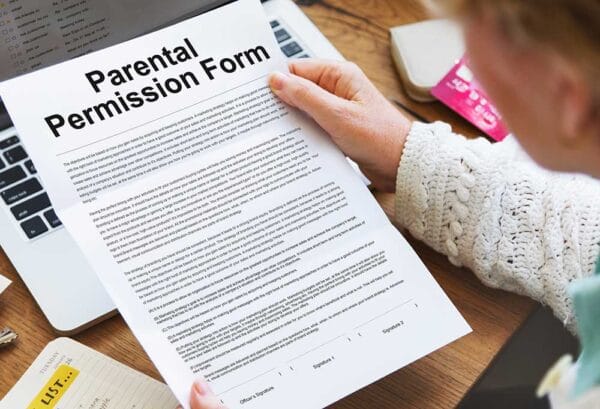
Illegal “gun violence” in the United States is an issue, prompting lawmakers to explore various strategies for regulation, regulations that usually affect law-abiding citizens more than the criminals.
Among these regulations, Permit-to-Purchase (PTP) laws have emerged as a means to screen and delay prospective gun buyers. These laws require individuals to undergo multiple(in the case of NJ & NY) background checks, and sometimes safety training or other procedural requirements, before acquiring a firearm. While proponents argue that such laws help reduce “gun violence” and suicide rates, critics assert that they place uncontitutional burdens on law-abiding citizens and violate Second Amendment (2A) protections, plus there is already a Federal background check system NICS in place for retail purchases. The constitutional debate gained new momentum after the Supreme Court’s 2022 ruling in Bruen, which shifted the legal framework for evaluating gun regulations.
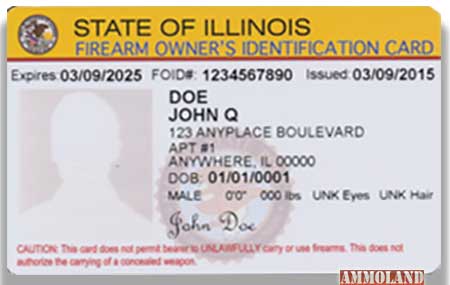
Permit-to-Purchase permission-slip laws exist in several states, including Connecticut, Massachusetts, New Jersey, and Hawaii, and these laws vary in scope and requirements, but typically require an applicant to:
- Submit an application with personal information.
- Pay a non-refundable fee,
- Undergo a background check that sometimes has an additional fee.
- Sometimes, it requires fingerprints, which may incur another fee.
- Complete firearms safety training, which may also incur another fee.
The intention behind these laws is to ensure that only individuals who meet specific “approved” criteria, such as not having a criminal background or a history of mental illness, can legally purchase firearms. Though studies suggest that states with PTP laws have lower rates of gun-related deaths (Kaufman et al., 2015), it’s again IMPORTANT to point out that gun dealers are REQUIRED to do a Federal background check (NICS E-Check), so what is the real purpose of the state PTP? And could the NICS Check be the actual reason for the lower rates?
The 2A to the United States Constitution reads: “A well regulated Militia, being necessary to the security of a free State, the right of the people to keep and bear Arms shall not be infringed.” The operative clause here is “shall not be infringed” (Ammoland (1), 2025).
Historically, the scope of the 2A was unclear until the Supreme Court’s decision in District of Columbia v. Heller (2008).
In Heller, the Court held that the 2A protects an individual’s right to possess firearms for lawful purposes, such as self-defense within the home. However, the Court also noted that this right is not unlimited and that certain regulatory measures are permissible.
In McDonald v. City of Chicago (2010), the Court extended this interpretation to the states through the 14th Amendment.
The New York State Rifle & Pistol Association v. Bruen (2022) decision marked a pivotal shift in 2A jurisprudence. The Court struck down New York’s “may-issue” concealed carry law, ruling that it violated the 2A by granting too much discretion to local authorities in issuing permits.
The Court introduced a new test for evaluating gun regulations: laws must be consistent with the “historical tradition of firearm regulation” in the United States. This test replaced the previous two-step approach that involved means-end scrutiny, and additionally, it adjusted Heller’s “this right is not unlimited and that certain regulatory measures are permissible.”
Following Bruen, courts have reevaluated existing gun laws under the historical tradition standard. PTP laws now face new scrutiny:
- In Maryland Shall Issue v. Moore (2023), a federal court struck down Maryland’s PTP law, stating it lacked historical precedent.
- In contrast, other courts have upheld PTP laws by improperly drawing analogies to historical licensing and surety laws from the 18th and 19th centuries.
So, currently, the constitutionality of PTP laws hinges on whether historical analogs can be identified, as per Bruen, and the Bruen ruling emphasized examining historical regulations from the time of the Founding Fathers. While no direct PTP laws existed in the 18th century, there were, however:
- Surety laws, which required individuals suspected of carrying weapons to post a bond.
- Militia laws, which required individuals to report for training with their firearms.
- Prohibitions on arming certain groups, such as felons or those deemed dangerous.
Proponents of PTP laws argue that these historical practices support the idea of regulating who can possess firearms, thereby justifying modern permitting schemes.
They claim:
- Public Safety: These laws prevent firearms from falling into the hands of dangerous individuals.
- Constitutional Flexibility: The 2A allows for regulations that serve compelling governmental interests.
- Historical Justification: Historical practices, while not identical, suggest an intent to regulate arms to some extent.
- Judicial Precedents: Prior to Bruen, courts upheld similar regulatory schemes under intermediate scrutiny (e.g., Kachalsky v. County of Westchester, 2012).
The critics of P2P laws argue:
- Impose Burdens: Due to bureaucratic hurdles, they may delay or prevent lawful gun ownership.
- Lack Historical Basis: No direct historical equivalent of PTP laws existed during the founding era.
- Create Inequities: Fees and training requirements may disproportionately affect low-income individuals.
- Open Door to Discretion: If poorly implemented, PTP laws can give authorities excessive power over who may exercise a constitutional right.
A major challenge in the debate over PTP laws is balancing the individual’s right to bear arms with what the government claims is its responsibility to ensure public safety. Proponents claim that Constitutional rights are not absolute; courts have long held that rights can be regulated when justified by compelling state interests, such as the example of the First Amendment right to free speech does not allow incitement to violence (Ammoland (2), 2025). Yelling fire in a theater, if there IS A FIRE, is good! But if there is no fire and people get hurt, there will be consequences.
Given the evolving legal landscape, the future of PTP laws remains uncertain. Courts will continue to grapple with how to apply the Bruen test and what constitutes a valid historical analogue. Legislative bodies may adjust their laws to align more closely with constitutional requirements. Legal scholars suggest that the Supreme Court may eventually provide more clarity by taking on a case directly challenging a PTP law. Until then, inconsistencies among lower courts are expected.
PTP laws occupy a very contentious space in American constitutional law at this time. They are supposedly designed to ‘enhance public safety’ by preventing dangerous individuals from acquiring firearms, but their procedural requirements raise great concerns about accessibility and constitutional validity.
PTP Laws, sound like a great idea!
With the best of intentions!
What could possibly go wrong?
Hopefully, the Supreme Court’s Bruen decision with its stricter standard for evaluating such laws, demanding historical consistency, will correctly put PTP to bed for good.
References:
- Ammoland (1)(2025). U.S. Second Amendment: Means ALL Weapons & ZERO Infringements.
- Ammoland (2)(2025). “Congress Shall Make No Law” vs. “Shall Not Be Infringed, (Ammoland, 2025)
- District of Columbia v. Heller, 554 U.S. 570 (2008).
- McDonald v. City of Chicago, 561 U.S. 742 (2010).
- New York State Rifle & Pistol Association v. Bruen, 597 U.S. ___ (2022).
- Kaufman, E. J., Morrison, C. N., Branas, C. C., Wiebe, D. J. (2015). State firearm laws and interstate firearm deaths. Preventive Medicine, 74, 28-30.
- Maryland Shall Issue v. Moore, No. 21-1985 (4th Cir. 2023).
- Kachalsky v. County of Westchester, 701 F.3d 81 (2d Cir. 2012).
- Spitzer, R. J. (2017). Gun Law History in the United States and Second Amendment Rights. Law and Contemporary Problems, 80(2), 55-83.
- Winkler, A. (2011). Gunfight: The Battle over the Right to Bear Arms in America. W. W. Norton & Company.
U.S. Second Amendment: Means ALL Weapons & ZERO Infringements ~ VIDEO
About the author:
Alan J. Chwick, A.S., B.S., FL/NY/SC Paralegal is known for his involvement in legal articles usually related to firearm regulations and for his contributions to discussions on gun rights. Retired Managing Coach of the Freeport NY Junior Marksmanship Club (FreeportJuniorClub.org). Escaped New York State to South Carolina and is an SC FFL & Gunsmith (Everything22andMore.com).
[email protected] | TWITTER & TRUTH: @iNCNF

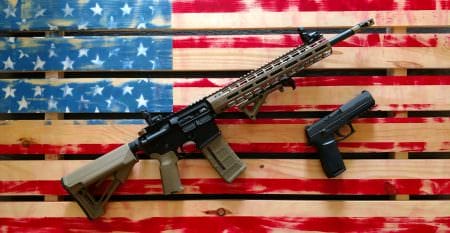
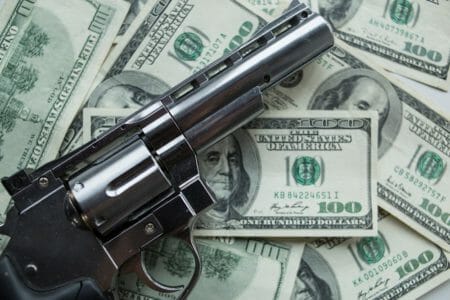
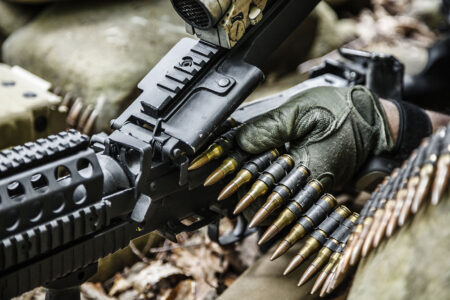

“No State shall convert a liberty into a privilege, license it, and charge a fee therefore.” Murdock v. Pennsylvania, 319 US 105 (1943). So per Murdock v. Pennsylvania, no permission, license, fee or tax may lawfully be assessed or required in order to exercise our enumerated rights, such as free speech, religion and bearing arms. Just as a poll tax is unconstitutional, so, too, are licenses to carry, permits to purchase firearms, FOID cards and “special occupational taxes” to build or own them.
Pretty sure Bruen ended “public safety” tests/considerations.
Pole tax by any other name
If you have to ask permission from “The Crown” to do something that is supposed to be a God-given right, then it’s not a right. It’s a privilege.
What a dumb question… of course! Courts have ruled so, repeatedly. “If the State converts a right (liberty) into a privilege, the citizen can ignore the license and fee and engage in the right (liberty) with impunity.” Shuttlesworth v. City of Birmingham, Alabama, 373 U.S. 262 (1969)
Many of us on this site understand that a right is not a privilege granted by government idiots .
I’m proud to say that in North Carolina, we repealed our Jim Crow-era pistol purchase permit law.
Restrictive numbers 1-5 are will be part of Washington state firearm purchasing laws. The bill passed the state legislature and is on its way to the governor, who is salivating at the opportunity to sign it. We will be required to pay to submit an application, undergo background and fingerprinting, undergo external “approved” training (including live fire which has its own related expense) and still submit to NICS at time of purchase with a 10 day delay. This greatly iimpacts any citizens who wish to carry concealed as the current “shall issue” Concealed Pistol License requires application, fee, fingerprinting and… Read more »
The term “gun violence” really gets me going. I’ve been around firearms since I was about 5 or 6 yrs old (59 currently) and have yet to witness any type of firearm point itself at someone and pull it’s own trigger. Can we as responsible gun owners stop using that phrase? Violence is an action perpetrated onto a victim by a violent or enraged person. The choice of weapon is irrelevant. Violence has been around since the dawn of time, yet we still don’t have the phrase “jawbone of an ass violence” Anything that you can put in your hand… Read more »